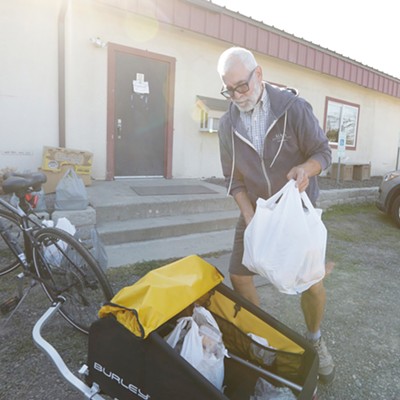Brian Estes could have chosen any metaphor, but he chose gardening.
The 24-year-old Richland native is the coordinator of a quarter-acre of land in Spokane’s Vinegar Flats, which is operated for St. Margaret’s Shelter, a home for destitute women run by Catholic Charities of Spokane. Most days, Estes, who is thin and wiry, with a black beard and impossibly tanned limbs, wakes up and pedals to the little patch of soil in the Hangman Creek valley to weed, water and pick over potatoes, turnips, basil, radishes, mizuna greens.
G.I. Joe for Animals
Janis Christensen keeps a packed bag by her front door, ready for the next call
A Full Plate
Leading Women’s and Children’s Free Restaurant, Marlene Alford plays many roles, mostly as problem-solver
A Different Current
David Konigsberg used to be driven only by adrenaline. Not any more.
Seeds of Change
Brian Estes believes gardens can grow more than just fruits and veggies
Sing It Loud
Redhawk Rice wants to give voice to the Voiceless
Gimme Shelter
Nancy Daly loves volunteering at Crosswalk. She has the tattoo to prove it.
“People have been growing food down here since before Spokane was here,” he says, looking out across the tall grass and up towards the South Hill towering above. “It’s nice to reclaim the space.”
The food that he, his assistants and the women at the shelter grow goes to residents at the Cathedral Plaza retirement home and to farmers markets in low-income areas, like West Central and Perry Street. He also works with the Spokane Tilth, a nonprofit devoted to sustainable agriculture.
Peers describe Estes as “amazingly passionate” about expanding the concept and practice of growing and distributing local, organic food to low-income people. You get a sense of that intensity and dedication as he wanders around the garden, describing his methods for keeping tomatoes warm in the cold micro-climate of the valley, how he keeps away pests with plants that attract countervailing, beneficial insects.
“I felt like quite the self-actualized hippie the other day,” he says. He smiles and tells about trapping a marmot in the garden and towing it on his bike trailer to a new home in High Bridge Park. “Not only did I spare its life after it showed our garden no quarter, but I did it in a zero-carbon way.” He laughs self-consciously.
And yet despite his apparent expertise, his mastery of this small patch of dirt, Estes is still a newbie in the garden.
A successful and ambitious student at Gonzaga, it wasn’t until a senior year focused on social justice and community organizing that he began to look at the role that food — eating, agriculture, economics — played in the discussion. That’s when he volunteered in the Vinegar Flats garden for the first time. Committed to eating locally throughout the winter, he bought himself a 25-pound bag of potatoes, to the amusement of his friends. He made a planter box for tomatoes out of a bookshelf at a Gonzaga honor house — “after which it was no longer useful as a bookshelf,” he wryly points out.
His ideas about food started to grow. At a time when the campus was riven by some polarizing issue he can no longer recall, he and other students organized a dinner, at which people from opposite sides of the issue would break bread together before discussing the matter at hand.
“It’s hard not to recognize someone’s humanity [at the dinner table],” he says. “Eating is so fundamental to who we are, and it’s so fundamentally pleasurable. It’s hard not to find yourself a more compassionate person when you have to look another person in the eyes to pass them something across the table.”
Still, most of his studies were academic, not practical. It wasn’t until an eight-month, post-collegiate road trip through Central America that he really got it, visiting communities where the people had to grow their food on cliffs in the mountains because the prime farmland was taken up by foreign subsidiaries growing bananas for the rest of the world. From an Internet café outside the Belizean jungle, he e-mailed Nadine Van Stone, the director of St. Margaret’s Shelter, and successfully argued for a position that didn’t really exist and for which he wasn’t very well qualified.
“I got home and went to the Richland Public Library and checked out probably half the books on gardening they had,” he says.
But for Estes, gardening has been about more than just mastering micro-climate and nitrogen cycles. He seems almost more interested in gardening as a metaphor for the way we interact with the world — and the people — around us.
“You have to know the land you’re working to be able to act,” he says, absent-mindedly plowing a furrow into the banks of the creek where we sit and talk. Even when that land, in the garden and elsewhere, is a mess of roots and weeds and thorns, bugs and rhizomes competing for food and water. “Being able to garden and grow food within a complex system isn’t supposed to be without its challenges. That’s how we want to approach challenges in our communities, too. We try to run the garden in a way that will match what we’re teaching people.”
Estes’ tenure as a Jesuit Volunteer at the garden ends this week, but he plans to stay on in staff capacity for another year or so while he looks for his next calling.
“I know I want to work with food, but whether I’ll be a community organizer, or write about it, or farm, or all three, I don’t know,” he says. “I’m in no big hurry. One of the things you learn in gardening is to be patient.”
To get involved with the Vinegar Flats garden or St. Margaret’s Shelter, email Brian Estes at smsgarden [at] gmail.com. To find out more about community gardening in Spokane, visit spokanegardens.com.




















